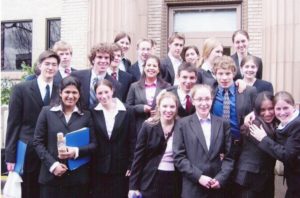Oregon-native, lawyer, and friend of CLP, Ed Piper has been helping craft our Mock Trial cases for several years. As we head into Mock Trial Regionals, we’re spotlighting Ed, learning about his experience with Mock Trial as a student, its influence on his career path, and his time volunteering at CLP. Plus, he’s giving us a tiny sneak peek into next year’s case!
Who are you? Occupation, location, where from, etc.
I’m a lawyer and an Oregonian to my core! I grew up in Lake Oswego and graduated from Catlin Gabel’s high school in 2005. After a brief sojourn in the Bay Area, where I went to college and law school, I came to my senses and returned to Oregon.
As a lawyer, I focus primarily on privacy and cybersecurity law. It’s an incredibly varied and complex (and thus fascinating) area of practice; much of my job involves figuring out how old laws apply to new technologies and occasionally arguing about whether and in what ways those old laws should evolve or adapt. Much by accident, I’ve also developed a small First Amendment practice, which I find exhilarating.
You participated in Mock Trial as a student. How did that impact you?
As a high school freshman, I was, for the most part, academically lost at sea. My classes were tolerably enjoyable, but I wasn’t all that interested in joining a club, playing a sport, or otherwise doing much of anything on an extracurricular basis. Eventually, my parents decreed that I needed to find something to do after school. At the time, I had a crush on someone on the Mock Trial team, so I tried out and ended up making the cut.

For me, doing Mock Trial was like emerging from the Platonic cave. It led me to discover that I’m a debater by nature and channeled my newfound competitive energy into something productive, interesting, and — most importantly — fun. It also was the first time I had ever spent five or six continuous months on a major project. When it finally came time for Trial, witnessing the results of our team’s hard work was both confidence-inspiring («We really did that!») and humbling («There’s no way I could’ve done that without my teammates.»).
Mock Trial has impacted me in a couple of unexpected ways, too. As a lawyer, I’ve litigated real cases with (and, in one case, against) many of the attorney coaches who worked with our team. And, this August, I’m getting married to the daughter of another.
Tell us about your experience and how it has led you to work with Civics Learning Project.
My high school experience turned me into a bonafide Mock Trial nerd. I was active in both college and law school Mock Trial, and when I became a lawyer, I stayed involved as a coach at the high school and college levels.
The topic of a Mock Trial case, I realized during that time, can majorly impact the quality of students’ experiences. After all, if you’re interested in civics and government, a constitutional case is likely going to get your mental juices flowing in a way that a slip-and-fall lawsuit just isn’t. So, when I returned to Oregon from California, I emailed CLP and asked if they’d let me write an original problem for the following year’s competition. Somewhat to my surprise, they said yes, and I’ve been doing it ever since.
Any predictions for future Mock Trial cases?
Next year’s case is in the works. I can’t give you specifics, but I can tell you this: it’ll definitely involve science and technology. Also, no promises, but many of Rowe’s favorite gadflies (e.g., Buddie Gartowski, the affable owner of Buddie’s Burgers; Jett Jones, one of Rowe’s best-known muckrakers; the omnipresent Jessica Gallagher; etc., etc.) are likely to make cameo appearances.
What’s your favorite thing about CLP?
Can I give you two? The mission and the people. The urgency of the mission (civics education) has, for obvious reasons, become especially glaring over the past couple of months. The work of reinvigorating our sense of civic consciousness is slow and difficult, but CLP is tirelessly committed. It’s a joy to watch.
That’s where CLP’s people come in: they’re extremely talented, unwavering in their commitment to CLP’s mission, and genuinely enjoy what they do. They’re able to generate so much enthusiasm among so many high school students — not to mention coaches, parents, and judges — about such constitutional nebulae as Montesquieu’s separation of powers philosophy, Federalist No. 78, and the War Powers Resolution?
Why should teachers and students get involved with CLP?
There are so many reasons! CLP’s programs expertly incorporate things like rhetoric, history, public speaking, teamwork, science, and much more. Ultimately, they’re designed for anyone who wants to think actively and critically about what it means to be a citizen in a democratic society. Also, as I can attest from long personal experience, they’re downright fun!
Anything else we should know about you?
CLP hosts a constitutional pub trivia competition, in which I’m often a participant and which is as enjoyable (and occasionally ridiculous) as it sounds. My team calls itself «the emanating penumbrae.» If you’re interested, we’re recruiting new members.
